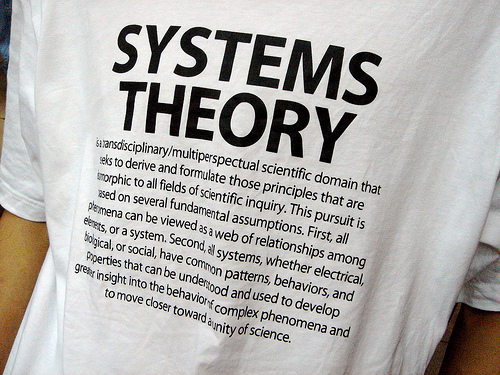Tag Archive: learning
June 14, 2010

|theory.isthereason.com|http://theory.isthereason.com/?p=1764|
One of our consultants just wrote the following e-mail to our team here at IISC. I thought it would be a good idea to put the question out to our readers – any thoughts?
Hello Colleagues,
I am wondering if you might have ideas about two things:
1. How to introduce systems thinking to a group – simply…
2. What questions you might ask when trying to identify leverage points in a planning process?
Context: The group has gathered a lot of anecdotal information, the intention is to gather additional information on best practices and research, however, we are not there yet. So how to begin to identify levers when we don’t have the benefit of having all data?
Thanks for any thoughts you might have on this!
June 14, 2010

|theory.isthereason.com|http://theory.isthereason.com/?p=1764|
One of our consultants just wrote the following e-mail to our team here at IISC. I thought it would be a good idea to put the question out to our readers – any thoughts?
Hello Colleagues,
I am wondering if you might have ideas about two things:
1. How to introduce systems thinking to a group – simply…
2. What questions you might ask when trying to identify leverage points in a planning process?
Context: The group has gathered a lot of anecdotal information, the intention is to gather additional information on best practices and research, however, we are not there yet. So how to begin to identify levers when we don’t have the benefit of having all data?
Thanks for any thoughts you might have on this!
June 9, 2010

|Photo by Scarleth White|http://www.flickr.com/photos/iloveblue/3302032125|
Thanks to Ginny McGinn of the Center for Whole Communities for introducing me to this poem by the Chilean biologist/philosopher Humberto Maturana. We used it to launch this week’s The Masterful Trainer workshop, and it generated some wonderful reflections on the role of teaching, training, facilitation, and leadership in this day and age. Enjoy . . .
The Student’s Prayer
Don’t impose on me what you know,
I want to explore the unknown
and be the source of my own discoveries.
Let the known be my liberation, not my slavery.
The world of your truth can be my limitation;
your wisdom my negation.
Don’t instruct me; let’s walk together.
Let my riches begin where yours end.
Show me so that I can stand
on your shoulders.
Reveal yourself so that I can be
something different.
You believe that every human being
can love and create.
I understand, then, your fear
when I ask you to live according to your wisdom.
You will not know who I am
by listening to yourself.
Don’t instruct me; let me be.
June 9, 2010

|Photo by Scarleth White|http://www.flickr.com/photos/iloveblue/3302032125|
Thanks to Ginny McGinn of the Center for Whole Communities for introducing me to this poem by the Chilean biologist/philosopher Humberto Maturana. We used it to launch this week’s The Masterful Trainer workshop, and it generated some wonderful reflections on the role of teaching, training, facilitation, and leadership in this day and age. Enjoy . . .
The Student’s Prayer
Don’t impose on me what you know,
I want to explore the unknown
and be the source of my own discoveries.
Let the known be my liberation, not my slavery.
The world of your truth can be my limitation;
your wisdom my negation.
Don’t instruct me; let’s walk together.
Let my riches begin where yours end.
Show me so that I can stand
on your shoulders.
Reveal yourself so that I can be
something different.
You believe that every human being
can love and create.
I understand, then, your fear
when I ask you to live according to your wisdom.
You will not know who I am
by listening to yourself.
Don’t instruct me; let me be.
April 15, 2010

|Photo by John D. McDonald|http://www.flickr.com/photos/psychoactive/2943294866|
Science has confirmed what many of us feel, that we are each more than one person. We are minds and bodies, left brains and right brains, controlled and automatic responders. This last division is due in part to the fact that we each have more than one brain. Our old reptilian brain is what we can depend on to keep us safe from physical harm most of the time. Our newest brain is what gives birth to the wonders of critical thought and creativity. The amazement I feel about the evolution of our higher thinking is dampened somewhat by my understanding and experience that my multiple brains are not often well coordinated. I walk into a meeting on the one hand (or brain) excited to facilitate, while on the other I am anxious, my more primitive wiring believing there’s a saber toothed tiger in the corner). Welcome to what Seth Godin calls “the lizard” inside.
Read More
July 9, 2009
Last week I had the privilege of co-delivering a workshop on collaboration and effective teams to this year’s crop of New Leaders for New Schools Residents as part of their Summer Foundations experience. These principals-to-be truly give one hope for the future of education in this country.
Prior to our two days of delivery, I heard Jeff Howard of the Efficacy Institute deliver a presentation to the Residents on the difference between what he called a “performance orientation” and a “learning orientation.” Howard’s claim is that schools often fail when they overemphasize student and staff performance at the expense of learning, and his message to the future school leaders was that they needed to think hard about what is most important as a long-term goal for the people in their building.
Read More
May 19, 2009
I’m intrigued by the idea of living systems and so I spend a lot of time thinking about what it is that gives a network a life of its own. If I’m convinced of the need of decentralized structures and in the power of self-organization then I have to concern myself with what it is that motivates networked efforts to take on a life of their own. When I look at my own experience of life in a network I understand that learning is a key motivator for decentralized self-organization.
To be specific: I want to learn the best way to apply the logic of decentralized structures to movement building efforts.
In order to do this: I read, I experiment, I share my learning, I become engaged in relationships with others who want to learn the same thing.
People who are engaged in a quest for something that they are passionate about come together of their own volition. I am part of a network of friends who are people interested in movement building and social transformation, we come together to socialize as well as to problem solve and learn together. In order to keep this network alive we most often have to overcome obstacles like being too busy working in some social change nonprofit!
So my own experience of life in a network demonstrates that the desire to learn about something that you are passionate about is great fuel for decentralized self-organization. But there is one more layer of nuance here. Among my group of friends we are not doing the kind of learning that is defined by some specific quantity of knowledge being transferred from one head to another, we are engage in the type of active learning that informs creative action.
So there is learning, but there is also something about creative power. But that’s a topic for another blog.




